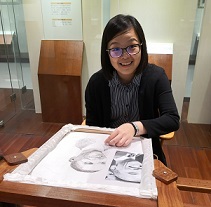賴秋琳

職稱:教授
聯絡電話:+886-2-27321104 #55735
電子郵件:jolenlai@tea.ntue.edu.tw
研究專長:數位學習、行動學習、學習行為與歷程分析、多媒體設計與數位出版
學歷:國立臺灣科技大學應用科技研究所博士
授課領域:學習科技與教學、數位學習、數位學習設計專題研究
研究室位置:篤行樓 Y735
個人網站:前往
SSCI論文
- Hwang, G. J.*, & Lai, C. L. (2017). Facilitating and Bridging Out-Of-Class and In-Class Learning: An Interactive E-Book Based Flipped Learning Approach for Math Courses. Educational Technology & Society, 20(1), 184-197. (SSCI)
- Hwang, G. J. *, Hsu, T. C., Lai, C. L., & Hsueh, C. J. (2017). Interaction of problem-based gaming and learning anxiety in language students' English listening performance and progressive behavioral patterns. Computers & Education, 106, 26-42. (SSCI)
- Lai, C. L., & Hwang, G. J.* (2016). A self-regulated flipped classroom approach to improving students’ learning performance in a mathematics course. Computers & Education, 100, 126-140. (SSCI)
- Lai, C. L., Hwang, G. J.*, Liang, J. C., & Tsai, C. C. (2016). Differences between mobile learning environmental preferences of high school teachers and students in Taiwan: a structural equation model analysis. Educational Technology Research and Development, 64(3), 533-554. (SSCI,第一作者)
- Lai, C. L., & Hwang, G. J.* (2015). An interactive peer-assessment criteria development approach to improving students' art design performance using handheld devices. Computers & Education, 85, 149-159. (SSCI,第一作者)
- Lai, C. L., & Hwang, G. J.* (2015). A spreadsheet-based visualized Mindtool for improving students’ learning performance in identifying relationships between numerical variables. Interactive Learning Environments, 23(2), 230-249. (SSCI,第一作者)
- Tu, Y. F.*, Hwang, G. J., & Lai, C. L. (Accepted). Facilitating learning by the visually impaired: Development and usability evaluation of a specially designed ubiquitous library. The Electronic Library. (SSCI)
- Tu, Y. F. *, Hwang, G. J., Chen, J. C. C., & Lai, C. L. (Accepted). University students’ attitudes towards ubiquitous library supported learning: An empirical investigation in the context of the Line@Library. The Electronic Library. (SSCI)
- Lai, C. L.* (Accepted). Exploring Taiwanese teachers’ preferences for STEM teaching in relation to their perceptions of STEM learning. Educational Technology & Society. (SSCI,單一作者)
- Lin, K. C., Lai, C. L., Cheng, I. L., & Chen, N. C.* (Accepted). Development of a badminton teaching system with wearable technology for improving students’ badminton doubles skills. Educational Technology Research and Development. (SSCI)
- Wu, S.-H. *, Lai, C.-L., Hwang, G.-J., & Tsai, C.-C. (2021). Research Trends in Technology-Enhanced Chemistry Learning: A Review of Comparative Research from 2010 to 2019. Journal of Science Education and Technology. (SSCI) https://doi.org/10.1007/s10956-020-09894-w
- Hwang, G. J., Wang, S. Y., & Lai, C. L.* (2021). Effects of a social regulation-based online learning approach on students’ learning achievements and behaviors in mathematics. Computers & Education, 160, 104031. (SSCI,通訊作者) (IF: 5.627) (Published online: Oct 11, 2020)
- Cheng, S. C., Hwang, G. J.*, & Lai, C. L. (2020). Critical research advancements of flipped learning: A review of the top 100 highly cited papers. Interactive Learning Environments. doi.org/10.1080/10494820.2020.1765395 (SSCI) (IF: 1.929) (Published online: May 27, 2020)
- Lai, C. L.* (2020). Trends of mobile learning: A review of the top 100 highly cited papers. British Journal of Educational Technology, 51(3), 721-742. doi: 10.1111/bjet.12884 (SSCI,單一作者) (IF: 2.588) (Published online: Sep 18, 2019)
- Chen, I. C., Hwang, G. J., Lai, C. L.*, & Wang, W. C. (2020). From design to reflection: Effects of peer-scoring and comments on students’ behavioral patterns and learning outcomes in musical theater performance. Computers & Education, 150, 103856. doi: https://doi.org/10.1016/j.compedu.2020.103856 (SSCI,通訊作者) (IF: 5.627) (Published online: Feb 02, 2020)
- Cheng, S. C., Hwang, G. J., & Lai, C. L.* (2020). Effects of the group leadership promotion approach on students’ higher order thinking awareness and online interactive behavioral patterns in a blended learning environment. Interactive Learning Environments, 28(2), 246-263. https://doi.org/10.1080/10494820.2019.1636075 (SSCI,通訊作者) (IF: 1.929) (Published online: Jan 01, 2019)
- Chung, C. J., Lai, C. L.*, & Hwang, G. J. (2019). Roles and Research Trends of flipped classrooms in nursing education: A review of academic publications from 2010 to 2017. Interactive Learning Environments. doi: 10.1080/10494820.2019.1619589 (SSCI,通訊作者) (IF: 1.929) (引用次數: 1次) (Published online: May 22, 2019)
- Chung, C. J., Hwang, G. J., *& Lai, C. L. (2019). A review of experimental mobile learning research in 2010-2016 based on the activity theory framework. Computers & Education, 129, 1-13 (SSCI) (IF: 5.627) (引用次數: 9次) (Published online: Oct 22, 2018)
- Ye, X. D., Chang, Y. H., & Lai, C. L.* (2019). An Interactive Problem-Posing Guiding Approach to Bridging and Facilitating Pre- and In-Class Learning for Flipped Classrooms. Interactive Learning Environments, 27(8), 1075-1092 (SSCI,通訊作者) (IF: 1.929) (引用次數: 7次) (Published online: Jul 10, 2018)
- Lai, C. L., Hwang, G. J. *, & Tu, Y. H. (2018). The effects of computer-supported self-regulation in science inquiry on learning outcomes, learning processes, and self-efficacy. Educational Technology Research and Development, 66(4), 863-892. doi: 10.1007/s11423-018-9585-y(SSCI,第一作者) (IF: 2.115) (引用次數: 5次) (Published online: Feb 26, 2018)
- Hwang, G. J., Lai, C. L.*, Liang, J. C., Chu, H. C., & Tsai, C. C. (2018). A long-term experiment to investigate the relationships between high school students’ perceptions of mobile learning and peer interaction and higher-order thinking tendencies. Educational Technology Research and Development, 66(1), 75-93. (SSCI,通訊作者) (IF: 2.115) (引用次數: 10次) (Published online: Aug 25, 2017)
- Chang, C. Y., Lai, C. L., & Hwang, G. J. * (2018). Trends and research issues of mobile learning studies in nursing education: A review of academic publications from 1971 to 2016. Computers & Education, 116(Supplement C), 28-48. (SSCI) (IF: 5.627) (引用次數: 32次) (Published online: Sep 06, 2017)
中/英文期刊論文
- Hwang, G. J.*, Lai, C. L., & Wang, S. Y. (2015). Seamless flipped learning: a mobile technology-enhanced flipped classroom with effective learning strategies. Journal of Computers in Education, 2(4), 449-473. (EI)
- Lai, C. L.*, & Hwang, G. J. (2015). High School Teachers’ Perspectives on Applying Different Mobile Learning Strategies to Science Courses: the National Mobile Learning Program in Taiwan. International Journal of Mobile Learning and Organization, 9(2), 124–145. (Scopus,第一作者,通訊作者)
- Lai, C. L.*, & Hwang, G. J. (2014). Effects of mobile learning time on students’ conception of collaboration, communication, complex problem-solving, meta-cognitive awareness and creativity. International Journal of Mobile Learning and Organization, 8(3), 276-291. (Scopus,第一作者,通訊作者)
- Hwang, G. J., Chu, H. C. & Lai, C. L.* (2017). PYOD-Prepare Your Own Device and Determination: A successfully promoted mobile learning mode in Taiwan. International Journal of Mobile Learning and Organization, 11(2), 87-107. (Scopus,通訊作者)
- Lai, C.-L.* (2020). From organization to elaboration: relationships between university students’ online information searching experience and judgements. Journal of Computers in Education. 7(4), 463-485. https://doi.org/10.1007/s40692-020-00163-8 (EI,單一作者)
- Hwang, G. J., Li, K. C. & Lai, C. L.* (2020). Trends and strategies for conducting effective STEM research and applications: a mobile and ubiquitous learning perspective. International Journal of Mobile Learning and Organisation, 14(2), 161-183. doi: 10.1504/IJMLO.2020.10022182 (Scopus,通訊作者,Published online: Jan 21, 2020)
- 賴秋琳* (2020)。STEM/STEAM與跨學科教育的研究趨勢與實踐模式。教育研究月刊,320,137-151。(單一作者,Publish: Dec, 2020)
- 廖畬柔、黃國禎、賴秋琳*、吳書豪(2020)。導入表格式心智工具至數位遊戲學習模式的潛在負面效應-化學課程應用的反思。國立臺灣科技大學人文社會學報,16(2),183-210。(Published: June, 2020)
- 陳俊魁、涂芸芳*、賴秋琳(2020)。探討證券從業人員網路自我效能、堅毅性以及網路學習態度之關係。國立臺灣科技大學人文社會學報,16(1),65-92。(Published: March, 2020)
- Cheng, S. C., & Lai, C. L.* (2019). Facilitating learning for students with special needs: a review of technology-supported special education studies. Journal of Computers in Education. doi: 10.1007/s40692-019-00150-8 (EI,通訊作者,Published online: Dec 03, 2019)
- 賴秋琳* (2019)。翻轉學習的科技發展及國際應用趨勢。教育研究月刊,301,104-133。(單一作者,Published: May, 2019)
- Chung, C. J. & Lai, C. L. (2019, Nov). Transformative learning functions and constructivist mobile learning environment preference and the impact of mobile self-efficacy for high school students. Paper presented at the Third International Conference for “Personal Epistemology and Learning in Digital Age” (PEL 2019), Taipei, Taiwan.
- Wu, S. H. & Lai, C. L. (2019, Sep). The role of technology in Chemistry experiment learning: A Review of Academic Publications from 1993 to 2018. Paper presented at the Second International Cognitive Cities Conference (IC3 2019), Kyoto, Japan.
- 吳書豪、賴秋琳 (2019)。科技輔助化學實驗教育:1993年至2018年之文獻回顧。第十四屆台灣數位學習發展研討會(TWELF 2019),雲林,臺灣。
- Lai, C. L., Hwang, G. J., & Chu, H. C. (2018, Jul). Effect of mobile learning implementing experience on high school teachers' self-efficacy of promoting the PYOD strategy. Paper presented at the 2018 International Conference on Open and Innovative Education (ICOIE 2018), Hong Kong.
- Lai, C. L., & Hwang, G. J. (2018, Apr). Impacts of game-based English learning approach on learning performances and behavioral patterns of EFL students with different English anxiety level. Paper presented at the 3rd International Conference on Digital Learning Strategies and Applications (DLSA 2018), Sapporo, Hokkaido, Japan.
- Lai, C. L., Hwang, G. J., & Tu, Y. H. (2017, Nov). Development of a mobile self-regulated learning mechanism for supporting students’ science learning courses. Paper presented at the 3rd International Conference on Innovation in Education 2017, Nakhon Pathom, Thailand.
- Lai, C. L., & Hwang, G. J. (2016, May). 行動科技導入教學經驗對教師行動學習態度之影響. Paper presented at the 20th Global Chinese Conference on Computers in Education (GCCCE 2016), Hong Kong.(The best research paper award for GCCCE 2016)
- Lai, C. L., & Hwang, G. J. (2015, Nov). An interactive e-book approach to supporting flipped learning in an elementary school math course. Paper presented at the 1st International Workshop on e-Book Based Educational Big Data for Enhancing Teaching and Learning (ICCE 2015), Hangzhou, China.
- 賴秋琳、黃國禎、朱蕙君 (2015年11月)。長期導入行動學習模式對教師教學策略採用及參與態度的影響。論文發表於第十一屆數位學習發展研討會(TWELF 2015),高雄市,臺灣。
- Lai, C. L., & Hwang, G. J. (2015, Jul). A Comparison on Mobile Learning Preferences of High School Teachers with Different Academic Backgrounds. Paper presented at the 4th International Conference on Learning Technologies and Learning Environments (LTLE 2015), Okayama, Japan.
- Lai, C. L., & Hwang, G. J. (2014, Oct). Effects of mobile learning participation time on high school students’ 21st century core competences. Paper presented at the International Conference of Educational Innovation through Technology (EITT 2014), Brisbane, Australia.
- Lai, C. L., & Hwang, G. J. (2014, Aug). A peer-assessment criteria development approach to improving critical thinking of students. Paper presented at the International Conference on Learning Technologies and Learning Environments (LTLE 2014), Kitakyushu, Japan.
- Lai, C. L., & Hwang, G. J. (2014, Nov). High School Teachers’ Perspectives on Applying Different Mobile Learning Strategies to Science Courses. Paper presented at the 2nd International Conference of Science Educators and Teachers (ISET 2014), Phuket, Thailand.
- Lai, C. L., & Hwang, G. J. (2013, Dec). Analysis of Students’ Learning Patterns in a Numerical Relationship Inference Activity with a Spreadsheet-based Computer Mindtool. Paper presented at the PNC Annual Conference and Joint Meetings (PNC 2013), Kyoto, Japan.
- Lai, C. L., Wang, S. Y., & Hwang, G. J. (2012, Aug). Development of a Spreadsheet-based Mindtool for Conducting E-Learning Activities in Geographic Courses. Paper presented at the International Conference of Educational Innovation through Technology (EITT 2012), Beijing, China.
- Lai, C. L., Hwang, G. H., & Chen, H. L. (2012, May). The Achievement Analysis of Augmented Reality in Education. Paper presented at the 16th Global Chinese Conference on Computers in Education (GCCCE 2012), Kenting, Taiwan.
- 王聖淵、楊力學、賴秋琳、劉詩妤、侯惠澤 (2012)。麥恩的反擊。2012 認知與數位教學及評量研討會,臺灣,台北,2012 月8 月18-19 日。
- 楊俊彥*、賴秋琳 (2021)。成長型心態對組織效能之研究-以報關業員工自主學習為例。「前瞻思維、跨域研究」研究生學術精進研討會,臺北,臺灣,2021年01月22日。
- 李致翔、吳書豪*、賴秋琳 (2020)。民眾對於 STEAM 工作坊的學習態度: 科教館「敲敲打打工作室」(Tinkering Studio)的實證調查研究。2020 年會員大會暨學術研討會,臺北,臺灣,2020年12月05日。
- 曾桔玲*、賴秋琳 (2020)。CIPP 評鑑核心素養導向課程-人際關係與團隊合作。培育未來公民:有力學習與創新教育,臺北,臺灣,2020年11月13-14日。
- Chen, Y. H. * & Lai, C. L. (2020, Jul). Development of STEAM Robotic Courses to Enhance Students’ Tendency to Develop 21st Century Skills. Paper presented at the International Conference on Open and Innovative Education (ICOIE 2020), Hong Kong, China.
- 黃國禎、朱蕙君、賴秋琳(2017)。行動與無所不在學習的定義與實施策略(第二版)。載於黃國禎、陳德懷(主編),未來教室、行動與無所不在學習。高等教育出版社,台灣。
- 黃國禎、朱蕙君、賴秋琳(2014)。行動與無所不在學習的定義與實施策略。載於黃國禎、陳德懷(主編),未來教室、行動與無所不在學習。高等教育出版社,台灣。
